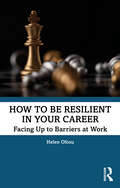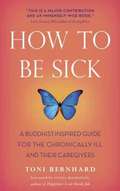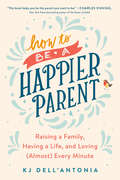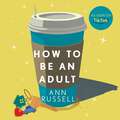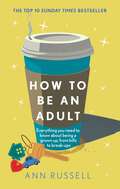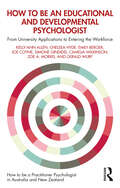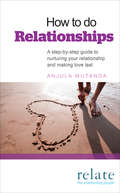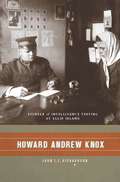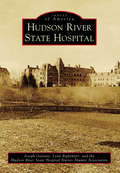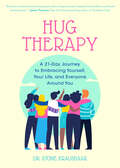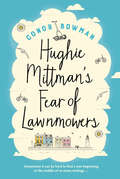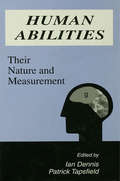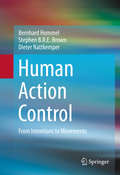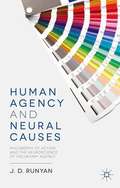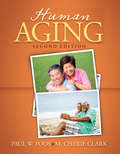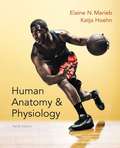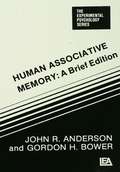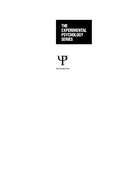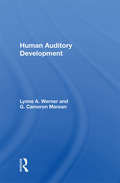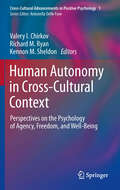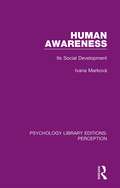- Table View
- List View
How to be Resilient in Your Career: Facing Up to Barriers at Work
by Helen OfosuThis book shares vital career advice to help professionals navigate common "internally disruptive" career experiences such as harassment and bullying, imposter syndrome, membership in an underrepresented group, toxic workplaces, discrimination, and more. Dr. Helen Ofosu draws on twenty years of helping employers acquire talent and coaching professionals through difficult career choices to unpack these layered and complicated issues in an easy-to-follow way. Dealing with the dark side of management, the book outlines various issues that can occur in the workplace, or during a person’s career journey, and offers practical advice on how to overcome these obstacles and setbacks. Using her considerable HR experience, Dr. Ofosu also offers coveted insights from the employer’s point of view. For people who have already tried other options to resolve their complicated career issues, this book offers an essential guide that equips readers with a knowledge base to make informed decisions around building and sustaining a thriving and resilient career. How to be Resilient in Your Career: Facing Up to Barriers at Work is a reliable resource presented with nuance, depth, and specificity. Psychologists, psychotherapists, social workers, and HR professionals who are looking for effective advice when supporting people struggling with these issues, will greatly benefit from this book, as will early career professionals, and established earners looking to resolve their career issues.
How to be Sick: A Buddhist-Inspired Guide for the Chronically III and their Caregivers
by Toni BernhardThis book will help and inspire those who must live with the challenges posed by any chronic illnesses, and their caregivers: the relentlessness of symptoms; coming to terms with a life of comparative isolation; weathering fear about the future; facing the judgment of others; dealing with the health care system; and, for a spouse, partner, or other caregiver, adapting to so many unexpected and sometimes sudden life changes.
How to be a Happier Parent: Raising a Family, Having a Life, and Loving (Almost) Every Minute
by Kj Dell'AntoniaAn encouraging guide to helping parents find more happiness in their day-to-day family life, from the former lead editor of the New York Times Motherlode blog.In all the writing and reporting KJ Dell'Antonia has done on families over the years, one topic keeps coming up again and again: parents crave a greater sense of happiness in their daily lives. In this optimistic, solution-packed book, KJ asks: How can we change our family life so that it is full of the joy we'd always hoped for? Drawing from the latest research and interviews with families, KJ discovers that it's possible to do more by doing less, and make our family life a refuge and pleasure, rather than another stress point in a hectic day. She focuses on nine common problem spots that cause parents the most grief, explores why they are hard, and offers small, doable, sometimes surprising steps you can take to make them better. Whether it's getting everyone out the door on time in the morning or making sure chores and homework get done without another battle, How to Be a Happier Parent shows that having a family isn't just about raising great kids and churning them out at destination: success. It's about experiencing joy--real joy, the kind you look back on, look forward to, and live for--along the way.
How to be an Adult: Everything you need to know about being a grown up, from bills to break-ups
by Ann Russell'Ann Russell has all the answers' Sunday Times'An agony aunt to an audience of millions' BBCFrom the much-loved 'Auntie' of TikTok, and author of How to Clean Everything and How to Save Money, How to Be an Adult is a practical guide to life - full of the things you should have been taught in school, but probably weren't.This book takes you through everything from the everyday to the unexpected, the practical to the personal. Whether you're learning how to budget, rent a flat, deal with a break-up, or cope with grief - or even just figuring out how to change a plug - Ann Russell is here to help.Written with warmth and years of experience, no one should leave home for the first time without this book.
How to be an Adult: Everything you need to know about being a grown up, from bills to break-ups
by Ann Russell'Ann Russell has all the answers' Sunday Times'An agony aunt to an audience of millions' BBCFrom the much-loved 'Auntie' of TikTok, and author of How to Clean Everything and How to Save Money, How to Be an Adult is a practical guide to life - full of the things you should have been taught in school, but probably weren't.This book takes you through everything from the everyday to the unexpected, the practical to the personal. Whether you're learning how to budget, rent a flat, deal with a break-up, or cope with grief - or even just figuring out how to change a plug - Ann Russell is here to help.Written with warmth and years of experience, no one should leave home for the first time without this book.
How to be an Adult: Everything you need to know about being a grown up, from bills to break-ups
by Ann Russell'Ann Russell has all the answers' Sunday Times'An agony aunt to an audience of millions' BBCFrom the much-loved 'Auntie' of TikTok, and author of How to Clean Everything and How to Save Money, How to Be an Adult is a practical guide to life - full of the things you should have been taught in school, but probably weren't.This book takes you through everything from the everyday to the unexpected, the practical to the personal. Whether you're learning how to budget, rent a flat, deal with a break-up, or cope with grief - or even just figuring out how to change a plug - Ann Russell is here to help.Written with warmth and years of experience, no one should leave home for the first time without this book.
How to be an Educational and Developmental Psychologist: From University Applications to Entering the Workforce (How to be a Practitioner Psychologist in Australia and New Zealand)
by Kelly-Ann Allen Chelsea Hyde Emily Berger Joe Coyne Simone Gindidis Camelia Wilkinson Zoe A. Morris Gerald WurfWritten in a clear and accessible style, this book presents a wealth of practical information to guide the next generation of educational and developmental psychologists in Australia and New Zealand in pursuing a career in the field. There are over 800 educational and developmental psychologists in Australia, and over 200 educational psychologists in New Zealand, who represent a diverse workforce. Pathways to becoming an educational and developmental psychologist have seen rapid shifts with updated key competencies that prospective educational and developmental psychologists need to be aware of. This book gives the reader a comprehensive understanding of what makes an educational and developmental psychologist and outlines seven steps required to become an endorsed educational and developmental psychologist. Specifically, it offers guidance on understanding the role and its history, tertiary study requirements, registration requirements, professional competencies, skills and attributes needed, work experience, professional associations and member groups, endorsement and supervision requirements, finding work, and starting work. With a primary focus on Australia, each chapter also features a section on the career in New Zealand, with a variety of psychologists sharing their expertise and reflections from their experiences in New Zealand. This resource is essential reading for students, provisional psychologists, and practising psychologists. At the same time, it provides insights for other educational and health professionals who may work multi-, inter-, or transdisciplinary with educational and developmental psychologists.
How to do Relationships: A step-by-step guide to nurturing your relationship and making love last
by Relate Anjula MutandaThe ultimate relationship guide from Relate - full of warm and friendly advice, case studies, exercises, questionnaires and key life moments to focus on. Your one stop shop to building, navigating and maintaining meaningful connections. 'Something to learn in every chapter' -- ***** Reader review'Should be compulsory reading for everyone' -- ***** Reader review'This is a MUST HAVE book for anyone' -- ***** Reader review'A very insightful book full of common sense' -- ***** Reader review*******************************************************************************************The course of true love isn't always smooth, but rocky relationships needn't be a recurring pattern.Written in conjunction with Relate, this guide will help you learn what makes relationships work, where they can falter, and how you can maintain a lasting, meaningful and loving connection.- Discover how your personalities and past experiences affect you both- Break negative patterns to build a happier foundation- Navigate relationship choices, such as moving in together, marriage and starting a family- Overcome any relationship obstacle with problem-solving techniquesWith guidance and support on every aspect of loving relationships, from the moment you meet 'the one' to growing old together, this positive and accessible book is the ultimate relationship guide.
Howard Andrew Knox: Pioneer of Intelligence Testing at Ellis Island
by John RichardsonHoward Andrew Knox (1885–1949) served as assistant surgeon at Ellis Island during the 1910s, administering a range of verbal and nonverbal tests to determine the mental capacity of potential immigrants. An early proponent of nonverbal intelligence testing (largely through the use of formboards and picture puzzles), Knox developed an evaluative approach that today informs the techniques of practitioners and researchers. Whether adapted to measure intelligence and performance in children, military recruits, neurological and psychiatric patients, or the average job applicant, Knox's pioneering methods are part of contemporary psychological practice and deserve in-depth investigation.Completing the first biography of this unjustly overlooked figure, John T. E. Richardson, former president of the International Society for the History of the Neurosciences, takes stock of Knox's understanding of intelligence and his legacy beyond Ellis Island. Consulting published and unpublished sources, Richardson establishes a chronology of Knox's life, including details of his medical training and his time as a physician for the U.S. Army. He describes the conditions that gave rise to intelligence testing, including the public's concern that the United States was opening its doors to the mentally unfit. He then recounts the development of intelligence tests by Knox and his colleagues and the widely-discussed publication of their research. Their work presents a useful and extremely human portrait of psychological testing and its limits, particularly the predicament of the people examined at Ellis Island. Richardson concludes with the development of Knox's work in later decades and its changing application in conjunction with modern psychological theory.
Hudson River State Hospital (Images of America)
by Joseph Galante Lynn Rightmyer the Hudson River State Hospital Nurses Alumni AssociationFor 141 years, Hudson River State Hospital was home to tens of thousands of individuals suffering from mental illness. The facility grew from a 208-acre parcel in 1871 with seven patients to 752 acres with five dozen separate buildings containing nearly 6,000 patients in 1954. The main building was constructed on a Kirkbride plan, a treating philosophy centered around an ornate building of equal proportions staffed by employees who integrated dignity and compassion into health care. Famous architects Frederick Clark Withers and Calvert Vaux drafted the main building in 1869. The landscape was penned by Frederick Law Olmstead, perhaps best known for the design of New York City's Central Park.
Hug Therapy Book
by Kathleen A. KeatingFrom the Publisher: Relax, raise your arms, place them around the person in front of you and squeeze gently. But, no bear hugs, please. Kathleen Keating and Mimi Noland combine their talents to show how and why all kinds of hugs have positive results on IQ, aging, self-esteem, and stress. Simple line art drawings of charismatic cartoon bears lend a whimsical touch to book guaranteed to touch your heart. A great gift idea for someone who needs a hug. A beary, beary uplifting book.
Hug Therapy: A 21-Day Journey to Embracing Yourself, Your Life, and Everyone Around You
by Dr. Stone KraushaarDiscover the healing power of hugs and how they can improve your life and your world in twnty-one days with this amazing guide.Dr. Stone’s prescription is for a twenty-one-second hug today and every day. One of the many benefits of hugging is that longer hugs have proven physiological benefits. Hugs are good for your immune system, your stress response, your sleep patterns, and so much more.Hug Therapy brings to life the meaning of hugging. In this book, you will discover:What it means to really, truly give yourself and others the profound gift of a hugHow to be powerfully in action and more aware of what matters to you mostThat you may choose to begin hugging some strangers . . . with their blessing of courseAnd perhaps most importantly, that together, one literal or metaphorical hug at a time, we make the world a better, healthier, and more connected place.Hug Therapy shares a full-on, unconditional hug from Dr. Stone Kraushaar. In this book, he invites you to wrap your arms around yourself, your life, and everyone around you in a whole new way. A good embrace?a hug?squeezes every ounce of fear, worry, and negativity out of your spirit, leaving you with nothing but warmth, inner peace, and a feeling of connection.Most people have difficulty remembering the last time someone gave them an all-encompassing hug. Hug Therapy encourages you to change that, one physical or metaphorical embrace at a time. It’s a “do good and feel great” book that will help you live more in the moment and stay tuned into what really matters.Praise for Hug Therapy“A re-envisioned, expanded, and brilliant twist that richly brings out the power of hugging in just 21 days. It teaches about the self-hug and how to bring it into one's outer circle, creating balance and harmony for the traveler.”?Kevin Zaborney, BA, MDiv, founder of National Hugging Day“Hug Therapy disrupts the simple act of a hug, turning it into a way to spark connection within you, your community, with strangers . . . and it may just end up bringing our planet to awareness of being one. Crazy, awesome hugs?of course you should become a part of this movement!”?Mich Hancock, co-founder of TEDxGatewayArch, host of MichMash Podcast
Hughie Mittman's Fear of Lawnmowers
by Conor BowmanSometimes it can be hard to find a new beginning in the middle of so many endings...Hughie Mittman is in search of forgiveness. He has just lost his mother and believes it is all his fault. And, with his father more distant than ever, how can Hughie make things right?As he does his best to navigate this unfamiliar version of his life, and overcome his fears - of loss, of change, of lawnmowers - he ignores the questions he really wants answered. Was his father telling the truth when he said Hughie was adopted? And will he really never get to see his mother again?Hughie Mittman's Fear of Lawnmowers is a heart-breaking but uplifting story about grief, the end of childhood, the power of friendship and the acceptance that although there are things we cannot change, the future can still be bright.
Human Abilities: Their Nature and Measurement
by Ian Dennis Patrick TapsfieldThis volume brings together many of the leading researchers on human intelligence and cognition to address issues including definition, measurement, and instructional design. Its publication is a result of the Inaugural Spearman Seminar recently held at the University of Plymouth -- a seminar that is slated to become a regularly scheduled event providing a major international forum for the presentation of work on human abilities. To properly inaugurate this series, scientific experts in this field were asked to reflect on various issues raised but not resolved in Charles Spearman's classic work, The Abilities of Man: Their Nature and Measurement, published in 1927.As a result of this approach, the book offers a unique overview of the way in which the study of human abilities has developed since 1927, and of current positions in the field. It offers exhaustive discussions on:* the nature of cognitive abilities and intelligence -- a review of how the factor analytic approach to abilities which grew out of Spearman's work has developed, thoughts regarding the contribution of a cross-cultural perspective, and an elucidation of some of the conceptual issues which often cloud discussions of ability;* different aspects of the contribution of cognitive psychology to our understanding of abilities -- the relationship between Spearman's g and working memory, links between attention and cognitive style, and the area of spatial abilities;* recent developments in latent variable and item response modeling; and* applied issues -- the argument that little predictive value can be gained in occupational selection from measuring abilities other than Spearman's g, and the question of aptitude treatment interactions in education.
Human Action Control
by Bernhard Hommel Stephen B. R. E. Brown Dieter NattkemperThis textbook provides a comprehensive introduction into the areas of human action planning and action control. It discusses the basic theoretical issues and questions in understanding the planning and control of human goal-directed action. The authors begin by presenting an integrative theoretical framework and the neurobiological foundations of action planning and execution. Subsequent chapters discuss how goals are represented and how they guide action control; how perception and action interact; how simple and complex actions are selected and planned; how multitasking works; and how actions are monitored. Topics of interest include: stimulus-triggered selections, rule-based selections, intentional action selections, and intuitive decision-making. Human Action Control is a must-have resource for advanced undergraduates, graduates, and doctorate students in cognitive psychology and related areas, such as the cognitive neurosciences, and developmental and social psychology.
Human Agency and Neural Causes: Philosophy of Action and the Neuroscience of Voluntary Agency
by J. D. RunyanHuman Agency and Neural Causes provides an analysis of our everyday thought about our conduct, and the neuroscience research concerning voluntary agency. J.D. Runyan argues that our findings through neuroscience are consistent with what would be expected if we are, in fact, voluntary agents.
Human Aging
by Paul W. Foos M. Cherie ClarkThis text offers a readable and friendly presentation of the important methods, findings, and theories of human aging, while actively involving the reader in meaningful exercises and critical thinking. Students are repeatedly challenged to apply information in the text to the older adults in their own lives. Specifically, suggestions for enhancing the lives of their older relatives are offered and encouraged. These include guidelines for discussions they might have regarding social, emotional, and environmental changes as well encouraging intellectual and social interaction. In this Edition: Emphasis on the science of the study of aging and why questions in aging are difficult to answer, how social scientists attempt to handle such difficulties, and the successes and failures social scientists have had thus far in answering those questions. The text also demonstrates how current research findings are now being applied in the real world and/or how they might be applied in the future. Cross-cultural comparisons and ethnic group comparisons are included wherever possible. Each chapter begins with "Senior View," which introduces students to a real person and gives them a chance to hear what older adults think and say about important issues related to the chapter and a chance to compare those opinions to the research findings. Each chapter ends with "Making Choices," emphasizing the important behavioral, emotional, and social choices that students can make now to prolong a healthy, happy life. "Chapter Projects" offer the opportunity for active learning, as students investigate for themselves an issue related to the chapter. Instructors can expand these projects for students who want to learn more, or for independent study. "Focus on Aging" boxes compliment the material in the text, providing additional insight and examples, and encouraging critical thinking. Every chapter includes discussion questions, study questions, chapter exercises, and related online resources.
Human Aging
by Paul W. Foos M. Cherie ClarkThis text offers a readable and friendly presentation of the important methods, findings, and theories of human aging, while actively involving the reader in meaningful exercises and critical thinking. Students are repeatedly challenged to apply information in the text to the older adults in their own lives. Specifically, suggestions for enhancing the lives of their older relatives are offered and encouraged. These include guidelines for discussions they might have regarding social, emotional, and environmental changes as well encouraging intellectual and social interaction. In this Edition: Emphasis on the science of the study of aging and why questions in aging are difficult to answer, how social scientists attempt to handle such difficulties, and the successes and failures social scientists have had thus far in answering those questions. The text also demonstrates how current research findings are now being applied in the real world and/or how they might be applied in the future. Cross-cultural comparisons and ethnic group comparisons are included wherever possible. Each chapter begins with "Senior View," which introduces students to a real person and gives them a chance to hear what older adults think and say about important issues related to the chapter and a chance to compare those opinions to the research findings. Each chapter ends with "Making Choices," emphasizing the important behavioral, emotional, and social choices that students can make now to prolong a healthy, happy life. "Chapter Projects" offer the opportunity for active learning, as students investigate for themselves an issue related to the chapter. Instructors can expand these projects for students who want to learn more, or for independent study. "Focus on Aging" boxes compliment the material in the text, providing additional insight and examples, and encouraging critical thinking. Every chapter includes discussion questions, study questions, chapter exercises, and related online resources.
Human Anatomy and Physiology 10th Edition
by Elaine N. Marieb Katja HoehnHuman Anatomy and Physiology is organized under the following units : 1)Organization of the Body 2)Covering, Support, and Movement of the Body 3)Regulation and Integration of the Body and 4) Maintenance of the Body.
Human Associative Memory
by John R. Anderson G. H. BowerPublished in 1980, part of the Experimental Psychology series. This book proposes and tests a theory about human memory, about how a person encodes, retains, and retrieves information from memory. This edition contains two major parts. First is the historical analysis of associationism and its countertraditions. This still provides the framework that has been used to relate the current research to an important intellectual tradition. This is reproduced without comment from the original book; historical analyses do not need as rapid revision as theoretical analyses. The second part of the book reproduces the major components of the HAM theory.
Human Associative Memory
by John R. Anderson G. H. BowerFirst published in 1973. This book proposes and tests a theory about human memory, about how a person encodes, retains, and retrieves information from memory. The book is especially concerned with memory for sentential materials. We propose a theoretical framework which is adequate for describing comprehension of linguistic materials, for exhibiting the internal representation of propositional materials, for characterizing the interpretative processes which encode this information into memory and make use of it for remembering, for answering questions, recognizing instances of known categories, drawing inferences, and making deductions.
Human Attention in Digital Environments
by Claudia RodaDigital systems, such as phones, computers and PDAs, place continuous demands on our cognitive and perceptual systems. They offer information and interaction opportunities well above our processing abilities, and often interrupt our activity. Appropriate allocation of attention is one of the key factors determining the success of creative activities, learning, collaboration, and many other human pursuits. This book presents research related to human attention in digital environments. Original contributions by leading researchers cover the conceptual framework of research aimed at modelling and supporting human attentional processes, the theoretical and software tools currently available, and various application areas. The authors explore the idea that attention has a key role to play in the design of future technology and discuss how such technology may continue supporting human activity in environments where multiple devices compete for people's limited cognitive resources.
Human Auditory Development
by Lynne A. WernerThis book overviews auditory development in nonhuman species and proposes a common time frame for human and nonhuman auditory development. It attempts to explain the mechanisms accounting for age-related change in several domains of auditory processing.
Human Autonomy in Cross-Cultural Context
by Kennon M. Sheldon Richard Ryan Valery I. ChirkovThis volume presents the reader with a stimulating tapestry of essays exploring the nature of personal autonomy, self-determination, and agency, and their role in human optimal functioning at multiple levels of analysis from personal to societal and cross-cultural. The starting point for these explorations is self-determination theory, an integrated theory of human motivation and healthy development which has been under development for more than three decades (Deci & Ryan, 2000). As the contributions will make clear, psychological autonomy is a concept that forms the bridge between the dependence of human behavior on biological and socio-cultural determinants on the one side, and people's ability to be free, reflective, and transforming agents who can challenge these dependencies, on the other. The authors within this volume share a vision that human autonomy is a fundamental pre-condition for both individuals and groups to thrive, and that without understanding the nature and mechanisms of autonomous agency vital social and human problems cannot be satisfactory addressed. This multidisciplinary team of researchers will collectively explore the nature of personal autonomy, considering its developmental origins, its expression within relationships, its importance within groups and organizational functioning, and its role in promoting to the democratic and economic development of societies. The book is aimed toward developmental, social, personality, and cross-cultural psychologists, towards researchers and practitioners' in the areas of education, health and medicine, social work and, economics, and also towards all interested in creating a more sustainable and just world society through promoting individual freedom and agency. This volume will provide a theoretical and conceptual account of the nature and psychological mechanisms of personal motivational autonomy and human agency; rich multidisciplinary empirical evidence supporting the claims and propositions about the nature of human autonomy and capacities for self-regulation; explanations of how and why different psychological and socio-cultural conditions may play a role in promoting or undermining people's autonomous motivation and well-being, discussions of how the promotion of human autonomy can positively influence environmental protection, democracy promotion and economic prosperity.
Human Awareness: Its Social Development (Psychology Library Editions: Perception #19)
by Ivana MarkováHuman awareness – which forms the basis of all interpersonal relationships – is perhaps the most fascinating phenomenon of biological and socio-cultural evolution. In this innovative book, originally published in 1987, the author introduces the subject of human awareness from the perspective of developmental and social psychology. Using a wide range of psychological and other sources, both classic and more recent from around the world, the book begins with a discussion of awareness as a biological and cultural-historical phenomenon. The reader is then guided through such issues as one’s awareness of others, self-awareness, interpersonal communication, and the search of human beings for recognition by others. The final chapter focuses on human awareness as a relationship between the self and society, with particular emphasis on social stability and change. Human Awareness provided the first comprehensive account of human consciousness in a text that reflected the most exciting recent research in the field at the time and emphasized the need for an integrated and coherent understanding of the various psychological disciplines.
